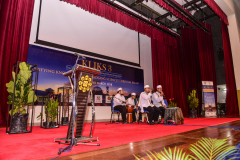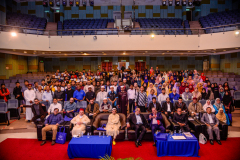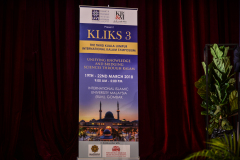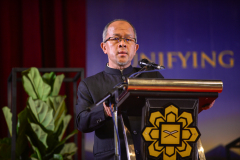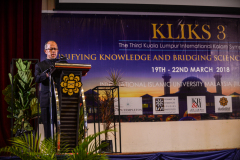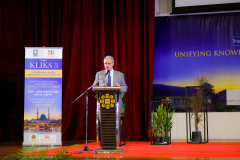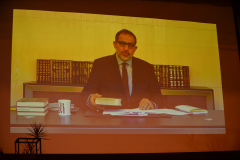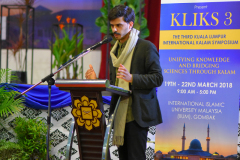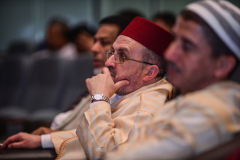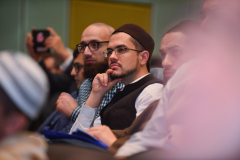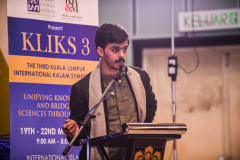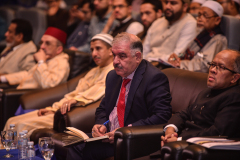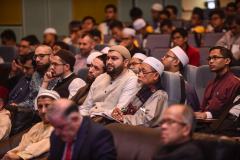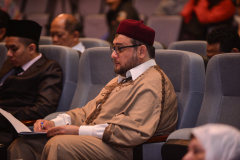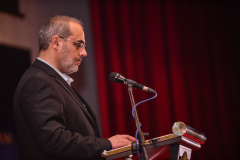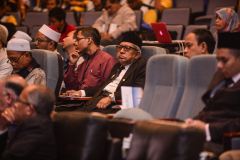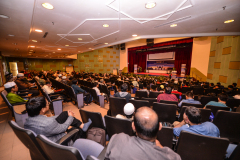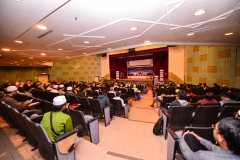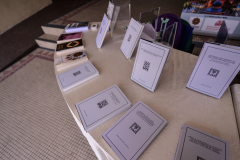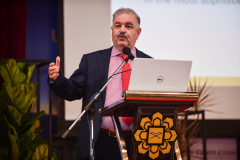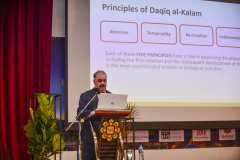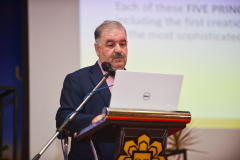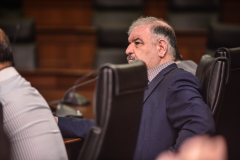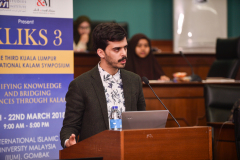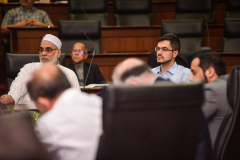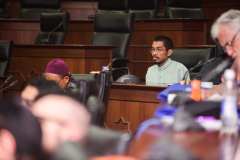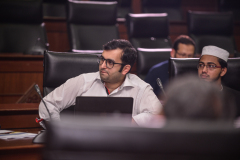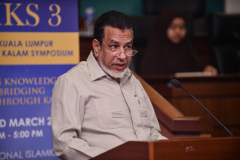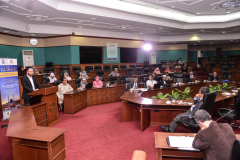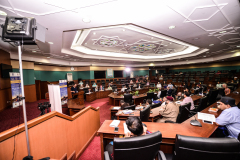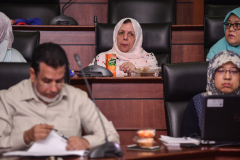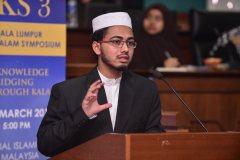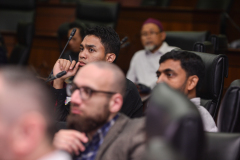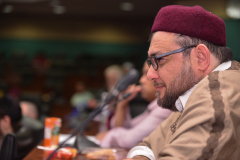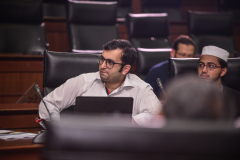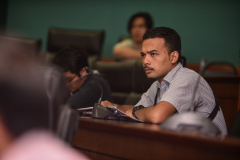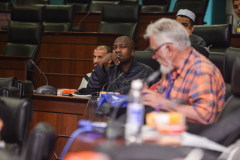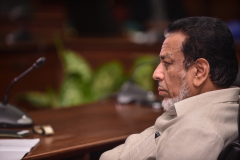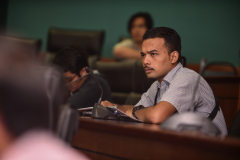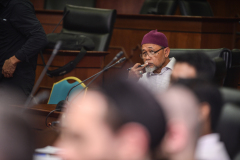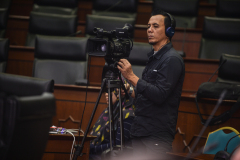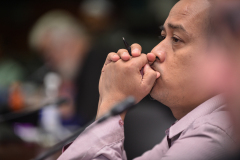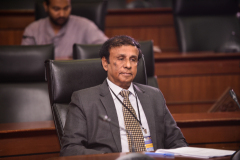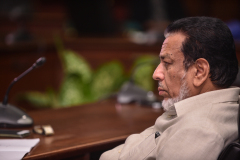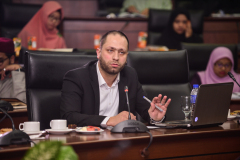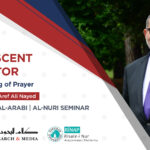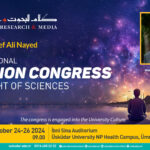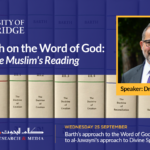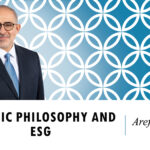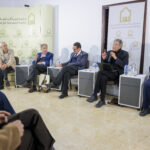Kalam Research and Media (KRM) in partnership with the Islamic and Strategic Studies Institute (KRM) in Malaysia and the John Templeton Foundation, organised the Third Kuala Lumpur International Kalam Symposium (KLIKS 3) on 19-22 March 2018 at the campus of the International Islamic University of Malaysia (IIUM).
Kalam Research and Media (KRM) in partnership with the Islamic and Strategic Studies Institute (KRM) in Malaysia, organised the Third Kuala Lumpur International Kalam Symposium (KLIKS 3) on 19-22 March 2018 at the campus of the International Islamic University of Malaysia (IIUM). The Symposium brought together almost 500 students, scholars and professionals from Malaysia and around the world take part on theme of “Unifying Knowledge and Bridging Sciences Through Kalam”.
This year the Symposium keynote speakers included Dr Aref Ali Nayed (Libya), Dr. Saeed Foudeh (Jordan), Professor Dr. Basil Altaie (Jordan), Sheikh Jamal Farouq (Egypt), Dr. Khalid Zahri (Morocco) and Dr. Muhammad Chantouf (Morocco).
This year the KLIKS event was held for a total of 4 days, with the additional two days being devoted to panels by graduate research students. More than twenty local and foreign academicians presented papers dealing with the topics related to theology, philosophy, science, education and ethics.
The theme this year is the Unification of Knowledge which includes the Physical Sciences, Social Sciences and the Religious Sciences – an apt theme that has been chosen in order to confront the biggest challenge of the 21st century, the intellectual challenge pertaining to the crises of knowledge and thought. The crises stem from the monopoly and dominance of modern Western framework of thought in the construction of knowledge and various sciences. Certain crises in the area of ecology, ethics and economics are in dire need of a new and religious discourse in order to overcome the consequences that emerge from the sole reliance on a secular framework as well as an agnostic, sceptic and atheistic knowledge system as constructed by modern Western thoughts. The current crises could be mitigated through a global initiative that of modern Western.
KLIKS 3 PROGRAMME
DAY ONE
• Qasida Performance by Muhibbeen Ensemble
• Welcoming Remarks by Dr Amran Muhammad, Director, ISSI Malaysia
• Welcoming Speech by Prof. Dr M. Abdul Quayum, Dean, Kulliyyah of Islamic Revealed Knowledge & Human Sciences, IIUM
• Introduction to Analytic Kalam Initiative by Sohail Nakhooda, Executive Director, KRM
• (Keynote Address 1) Kalam and the Quest for the Unity of Knowledge by Dr Aref Ali Nayed, Chairman, KRM
• (Keynote Address 2) Kalam’s Engagement with Western Philosophy by Dr Saeed Foudeh, Chief Theology and Philosophy Advisor, King Hussein bin Talal Mosque, Amman, Jordan
• (Keynote Address 3) Facing the Challenges of Modern Natural Sciences with Daqiq al-Kalam by Dr Basil Altaie, Yarmouk University, Irbid, Jordan
DAY TWO
• (Keynote Address 4) Kalam and its Relation to Tafsir and Hadith Studies by Dr Khalid Zahri, Assistant Director Hassania Royal Library of Morocco
• (Keynote Address 5) Kalam and Its Relation to Fiqh and Usul al-Fiqh by Dr Muhammed Chantouf, Dean Faculty of Usul al-Din, University Abd al-Malik Sa’d
• (Keynote Address 6) by Sheikh Jamal Farouq, Al-Azhar University, Egypt
• Panel Discussion on “Unifying Knowledge and Bridging Sciences Through Kalam” with Dr Saeed Foudeh, Dr Basil Altaie, Dr Khalid Zahri, Dr Muhammed Chantouf, chaired by Dr Fatmir Shehu
DAY THREE (GRADUATE RESEARCH PRESENTATIONS)
Panel 1 (Moderated by Prof. Dr Mohammad Mumtaz Ali)
• “A Neo-Kalamic Cosmology: Integrating Dembski’s Information Theory with Kalam” (Dr Shoaib Ahmed Malik, Zayed University, UAE);
• “The Epistemological Importance of Mass-Transmission (tawatur) in the Kalam Discourse” (Salah Nweider, Kalam Research & Media, Jordan)
• “Continuance of Accidents (a’rad) is inconceivable: Kalam’s Axiom with Quantum Implications revisited” (Hafiz Nazeer Abbas, Indira Gandhi National Open University, India)
Panel 2 (Moderated by Dr Noor Amali Mohd Daud)
• “The Subject Matter of ‘Ilm al-Kalam and its Consequences for the Bridging of the Sciences” (Abdurrahman Mihirig, Harvard University, USA);
• “Knowledge Map Between Kalam Atomism and Modern Physics” (Dr Shahidan Radiman, School of Physics and Novel Materials, UKM, Malaysia)
• “Stacks of Plates and Cosmic Kebabs: Some Reflections on Muslim Receptions of Scientific Cosmographies” (Omar Anchassi, University of Exeter, UK)
Panel 3 (Moderated by Dr Mohd Noh Abdul Jalil)
• “Exploring Unifying Principles Beyond Clashes: From Classical Disagreement in Kalam to a Framework of Modern Ethics” (Dr. Amilah Binti Awang Abd Rahman, International Islamic University Malaysia, IIUM);
• “Kalam, Quantum Theory, and the Dark Places of Theology” (Karim Kocsenda, University of Nottingham, UK)
• “Debating Theology: The Reception of Kalam in the 16th Century Ottoman Empire” (Firas Alkhateeb, University of Chicago, Instructor at Darul Qasim Institute, USA)
Panel 4 (Moderated by Dr Nur Suriya Mohd Noor)
• “Elements of Mathematization in the tradition of Kalām: A Survey of Selected Works” (Muhammad Ikhwan Azlan, International Islamic University of Selangor, Malaysia)
• “Towards an integrated Islamic Model of Philosophy of Mind and its Implications for Kalam” (Yusuf Jha, University of Nottingham, UK)
• “Debating Theology: The Reception of Kalam in the 16th Century Ottoman Empire” (Firas Alkhateeb, University of Chicago, Instructor at Darul Qasim Institute, USA)
DAY FOUR (GRADUATE RESEARCH PRESENTATIONS)
Panel 5 (Moderated by Dr Wan Mohd Azam Mohd Amin)
• “Integration of Knowledge: Gontor Experience” (Muhammad Abdul Aziz (International Islamic University Malaysia);
• “The Significance of Meaning: Situating Interpretive Anthropological Approach in Revisiting Religious Rituals and Practices” (Rafeeq Karimpanackal (Darul Huda, The University of Calicut, India)
• “The Conditions of a Creative Islamic Discourse: Insights from the works of Taha Abderrahmane” (Monir Birouk (Mohammed V University, Morocco)
Panel 6 (Moderated by Dr Adibah Abdul Rahim )
• “Kalam and the Diverse Approaches in the Study of Religions: Ibn Hazm, al-Biruni and al-Shahrastani” (Dr Haslina Ibrahim, International Islamic University Malaysia)
• “The Concept of the Inherently Good and Bad in Māturīdī Kalām and Its Implications for the Hereafter” (Muhammed Stodolsky, Dar al-Qasim, USA)
• “Sense sans God. The divine residue in atheist narratives” (Abdulhakim El Gadi, Kalam Research & Media, Jordan)
Panel 7 (Moderated by Dr Megawati Moris)
• “Cosmokalam Platform: A Computer-Aided Analysis of Kalām Structure.” (Mohareb Al-Rashidi, Data Scientist, Kingdom of Saudi Arabia)
• CONCLUDING SESSION SPEECH by Prof. Dr Rahmah Ahmad H. Osman, Deputy Rector, Research & Innovation, IIUM



